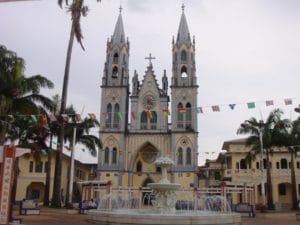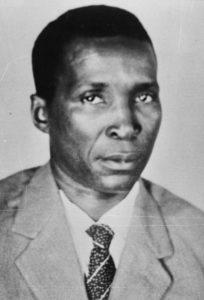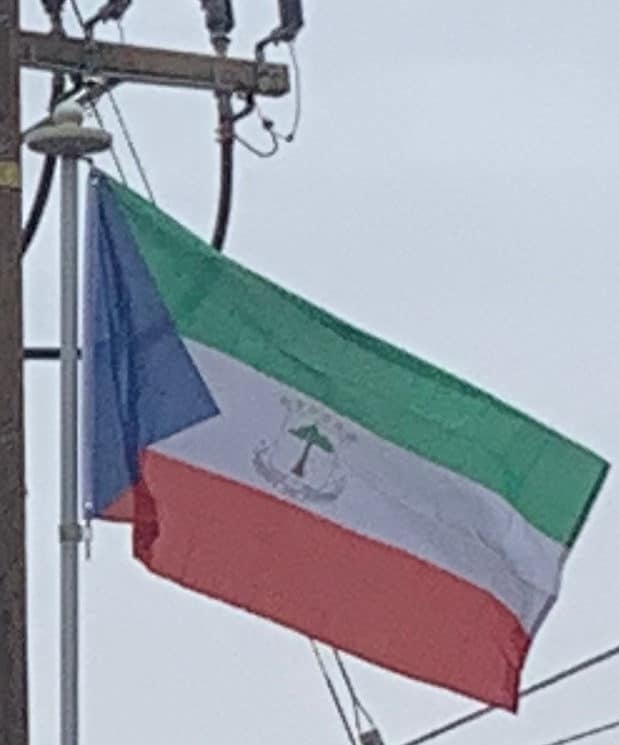This ‘provincial’ phase saw the beginnings of nationalism, but chiefly among small groups who had taken refuge from the Caudillo’s paternal hand in Cameroun and Gabon. They formed two bodies: the Movimiento Nacional de Liberación de la Guinea (MONALIGE), and the Idea Popular de Guinea Ecuatorial (IPGE). The pressure they could bring to bear was weak, but the general trend in West Africa was not, and by the late 1960s much of the African continent had been granted independence. Aware of this trend, the Spanish began to increase efforts to prepare the country for independence and massively stepped up development. The Gross National Product per capita in 1965 was $466 which was the highest in black Africa, and the Spanish constructed an international airport at Santa Isabel, a television station and increased the literacy rate to a relatively high 89%. At the same time measures were taken to battle sleeping sickness and leprosy in the enclave, and by 1967 the number of hospital beds per capita in Equatorial Guinea was higher than Spain itself, with 1637 beds in 16 hospitals. All the same, measures to improve education floundered and like in the Democratic Republic of Congo by the end of colonial rule the number of Africans in higher education was in only the double digits, and political education necessary to a functioning state was negligible.

A decision of 9 August 1963, approved by a referendum of 15 December 1963, gave the territory a measure of autonomy and the administrative promotion of a ‘moderate’ group, the Movimiento de Unión Nacional de la Guinea Ecuatorial (MUNGE). This proved a feeble instrument, and, with growing pressure for change from the UN, Madrid was gradually forced to give way to the currents of nationalism. Two General Assembly resolutions were passed in 1965 ordering Spain to grant independence to the colony, and in 1966 a UN Commission toured the country before recommending the same thing. In response, the Spanish declared that they would hold a constitutional convention on 27 October 1967 to negotiate a new constitution for an independent Equatorial Guinea. The conference was attended by 41 local delegates and 25 Spaniards. The Africans were principally divided between Fernandinos and Bubi on one side, who feared a loss of privileges and ‘swamping’ by the Fang majority, and the Río Muni Fang nationalists on the other. At the conference the leading Fang figure, the later first president Francisco Macías Nguema gave a controversial speech in which he claimed that Adolf Hitler had ‘saved Africa’

After nine sessions the conference was suspended due to deadlock between the ‘unionists’ and ‘separatists’ who wanted a separate Fernando Pó. Macías resolved to travel to the UN to bolster international awareness of the issue, and his firebrand speeches in New York contributed to Spain naming a date for both independence and general elections. In July 1968 virtually all Bubi leaders journed to the UN in New York to try and raise awareness for their cause, but the world community was uninterested in quibbling over the specifics of colonial independence. The 1960s were a time of great optimism over the future of the former African colonies, and groups that had been close to European rulers like the Bubi were not viewed positively.
Independence under Macías (1968–1979):
Independence from Spain was gained on 12 October 1968 and the region became the Republic of Equatorial Guinea. Macías became president in the country’s only free and fair election. The Spanish had backed Macías in the election due to his perceived loyalty, however while on the campaign trail he had proven to be far less easy to handle than they had expected. Much of his campaigning involved visiting rural areas of Río Muni and promising young Fang that they would have the houses and wives of the Spanish if they voted for him. In the towns he had instead presented himself as the urbane leader who had bested the Spanish at the UN, and he had won in the second round of voting – greatly helped by the vote-splitting of his rivals.
